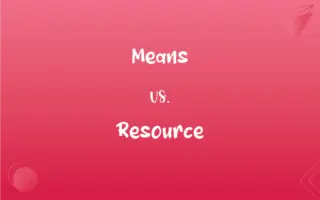Suffix vs. Title: What's the Difference?
Edited by Janet White || By Harlon Moss || Updated on November 7, 2023
A suffix is an affix added to the end of a word to modify its meaning, while a title is a prefix or term signifying rank, profession, or honorary status.

Key Differences
A suffix is a linguistic element appended to the end of a word to alter its form or create a new word. It often changes the grammatical function within a sentence. A title, conversely, is used before a name, showcasing one’s professional position, academic achievement, social rank, or honor.
Suffixes can denote the tense of verbs, the degree of adjectives, or the gender of nouns, among other grammatical roles. Titles, however, do not influence the grammatical structure but provide context about the individual’s status, expertise, or marital status.
In English, suffixes can be derivational, changing the word class or meaning, or inflectional, modifying tense, case, or number. Titles, though, remain largely unaltered and are selected based on societal conventions or personal accomplishments.
The use of suffixes is intrinsic to the language and affects the lexicon universally. Titles are cultural markers that often require external recognition or a formal conferment, varying greatly from one society to another.
Suffixes are bound morphemes, meaning they cannot stand alone and must be attached to other words. Titles are standalone terms that are placed before a person’s name as a sign of respect or recognition, independent of the linguistic structure of a sentence.
ADVERTISEMENT
Comparison Chart
Position in Language
At the end of a word
Before a person's name
Function
Modifies meaning and grammatical role
Signifies rank or status
Dependency
Cannot stand alone; must be attached
Can stand alone
Examples
-ness, -ly, -hood
Mr., Dr., Queen
Changeability
Can vary within the same word class
Usually fixed for an individual
ADVERTISEMENT
Suffix and Title Definitions
Suffix
A morpheme added at the end of a word to form a derivative.
Friendliness includes the suffix -ness.
Title
A title can be an appellation of nobility or honor.
Queen Elizabeth was loved by many.
Suffix
A suffix can indicate the word’s part of speech.
Quickly is formed by adding -ly to quick.
Title
A formal designation before a name indicating status or occupation.
Doctor Smith will see you now.
Suffix
It can show plurality or possession when used in nouns.
Dogs has the plural suffix -s.
Title
A title can represent the theme of a speech or essay.
His speech had the title 'The Future of Innovation.'
Suffix
In names, a suffix can denote generational status.
Edward III carries the suffix III for the third.
Title
In media, a title is the name of a book, film, or artwork.
The title 'War and Peace' is recognized worldwide.
Suffix
Suffixes serve grammatical purposes, indicating verb tense, case, etc.
She is running has the present tense suffix -ing.
Title
In legal documents, a title is evidence of ownership.
She holds the title to the property.
Suffix
An affix added to the end of a word or stem, serving to form a new word or functioning as an inflectional ending, such as -ness in gentleness, -ing in walking, or -s in sits.
Title
An identifying name given to a book, play, film, musical composition, or other work.
Suffix
To add as a suffix.
Title
A general or descriptive heading, as of a book chapter.
FAQs
Do suffixes affect the tense of words?
Yes, some suffixes indicate the tense of verbs, like the past tense suffix "-ed."
What is a suffix?
A suffix is an affix that’s added to the end of a root word to change its meaning or grammatical function.
Is a title used within a sentence structure?
A title is not part of the sentence structure; it precedes a person’s name as a form of address.
Can titles be inherited?
Some titles, especially those of nobility, can be inherited.
Can a suffix be a standalone word?
No, a suffix cannot stand alone; it must be attached to a root word.
What are some examples of suffixes?
Examples include "-ment," "-ation," and "-ly."
Can a word have multiple suffixes?
Yes, a word can have more than one suffix, like "unbelievably," with "-able" and "-ly."
How do titles differ culturally?
Titles vary based on cultural respect, professional hierarchy, and academic accomplishment.
What is a title?
A title is a word or phrase indicating a person's rank, profession, or academic achievement.
What are examples of titles?
Titles include "Mr.," "Dr.," "Senator," and "Professor."
Do titles always precede a name?
Most often, yes, but sometimes they can follow a name, particularly in formal listings.
Can a woman's title change after marriage?
Yes, a woman may choose to change her title from "Miss" to "Mrs." upon marriage.
Are suffixes important in English grammar?
Yes, suffixes play a crucial role in English grammar by modifying word function and meaning.
Can titles change over time?
Personal titles may change with new qualifications or positions; honorific titles may change with marital status.
Are titles used for objects or concepts?
Yes, titles are used for works of art, books, and positions, but they are different from personal titles.
Can a title be self-assigned?
Professional titles should not be self-assigned and are typically earned or granted.
What suffix indicates an action or process?
The suffix "-tion," as in "creation," indicates an action or process.
Is a suffix part of a person’s legal name?
It can be, especially generational suffixes like "Jr." or "III."
Are suffixes used in every language?
Many languages use suffixes, but the specifics and rules vary.
Does adding a suffix always change a word’s spelling?
Adding a suffix can change the spelling, as in "happy" to "happiness," where the "y" changes to "i."
About Author
Written by
Harlon MossHarlon is a seasoned quality moderator and accomplished content writer for Difference Wiki. An alumnus of the prestigious University of California, he earned his degree in Computer Science. Leveraging his academic background, Harlon brings a meticulous and informed perspective to his work, ensuring content accuracy and excellence.
Edited by
Janet WhiteJanet White has been an esteemed writer and blogger for Difference Wiki. Holding a Master's degree in Science and Medical Journalism from the prestigious Boston University, she has consistently demonstrated her expertise and passion for her field. When she's not immersed in her work, Janet relishes her time exercising, delving into a good book, and cherishing moments with friends and family.































































